Зарегистрируйтесь на getAbstract, чтобы получить доступ к этому краткому изложению.

Зарегистрируйтесь на getAbstract, чтобы получить доступ к этому краткому изложению.
Mustafa Suleyman, Yuval Noah Harari and Zanny Minton-Beddoes
What Does the AI Revolution Mean for Our Future?
How will AI impact our immediate and near future? Can the technology be controlled, and does it have agency? Watch DeepMind co-founder Mustafa Suleyman and Yuval Noah Harari debate these questions, with The Economist editor-in-chief Zanny Minton-Beddoes.
The Economist, 2023
Что внутри?
As innovation and risk accelerate, AI takes baby steps toward an impactful but uncertain evolution.
Recommendation
Can artificial intelligence be controlled, and how will it change global economies, politics and daily lives? DeepMind co-founder Mustafa Suleyman and historian Yuval Noah Harari spoke with The Economist’s editor-in-chief Zanny Minton-Beddoes about what the “AI Revolution” means to humanity’s future, and whether inevitable changes caused by this burgeoning technology threaten liberal democracy. The conversation provides a balanced look at how AI reveals risks and rewards as it changes the world order, often in unexpected ways.
Summary
About the Speakers
Mustafa Suleyman is the co-founder of DeepMind and Inflection AI. He is the author of The Coming Wave: Technology, Power and the 21st Century’s Greatest Dilemma. Yuval Noah Harari is a historian and the author of Sapiens: A Brief History of Humankind; Homo Deus: A Brief History of Tomorrow; and 21 Lessons for the 21st Century. Zanny Minton-Beddoes is editor-in-chief of The Economist.



























Comment on this summary